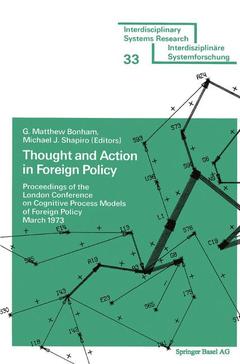Description
Thought and Action in Foreign Policy
Proceedings of the London Conference on Cognitive Process Models of Foreign Policy March 1973
Interdisciplinary Systems Research Series
Authors: BOHAM , SHAPIRO
Language: English
Subject for Thought and Action in Foreign Policy:
Keywords
conflict; decision-making; democracy; foreign policy; Policy; social science
Publication date: 01-1977
357 p. · 15.5x23.5 cm · Paperback
357 p. · 15.5x23.5 cm · Paperback
Description
/li>Contents
/li>
This volume is the product of the Conference on Cognitive Process Models of Foreign Policy Decision-Making which was held in London at the Richardson Institute for Conflict and Peace Research from March 17-24, 1973. We would like to thank Michael Nicholson, Director of the Richardson Institute, for acting as the host of the Conference. Support for the Conference and the preparation of the Conference papers for publication was provided by the Mathematical Social Sciences Board (MSSB). The MSSB is funded by aNational Science Foundation grant which is administered by the Center for Advanced Study in the Behavioral Sciences as the primary grantee. We are grateful to Hayward Alker, Jr. and William H. Riker of the MSSB for their help and encouragement. The graph shown on the cover is a cognitive map representation of the output from our computer simulation of foreign pOlicy decision-making. We would like to thank Robert Axelrod and Gary Raffel of the University of Michigan for generating the graph. PART I INTRODUCTION 1 CHAPTER 1 THOUGHT AND ACTION IN FOREIGN POLICY G. MATTHEW BONHAM The American University MICHAEL J. SHAPIRO University of Hawaii Introduction The papers assembled here constitute, and to some extent represent, widely disparate views of foreign policy thinking and decision-making. As is the case with almost any collective enterprise, it is possible to suggest some noteworthy resemblances among the contributions to this volume and to indicate grounds for distinguishing them from other "approaches.
Thought and Action in Foreign Policy.- Foreign Policy Decision-Makers Viewed Psychologically: Cognitive Processes Approaches.- The Process of Perception.- Finland as a “Friendly Neighbor” and Finland as an “Independent Western Democracy”: An Illustrative Case Study on the Problems of Image Policy.- Mapping the Elite’s Cognitive World: Swedish Elites and Security Policy Planning.- Minimizing Misperception.- Perceptional Organization.- Lying and the Stress for Cognitive Consistency.- How a Schema is Used to Interpret Information.- Decision Models.- Classical Theories of Foreign Policy Making as Cognitive Archetypes.- On Simulating Collective Security Regime Alternatives.- Foreign Policy Decision-Making in Finland and Austria: The Application of a Cognitive Process Model.
© 2024 LAVOISIER S.A.S.




